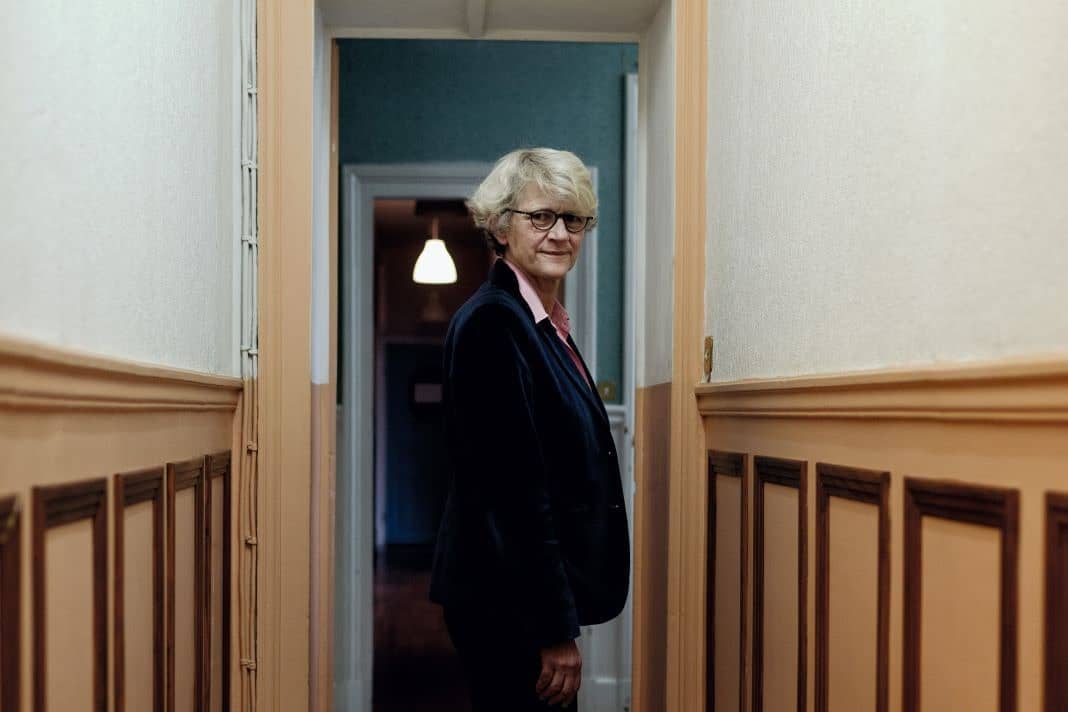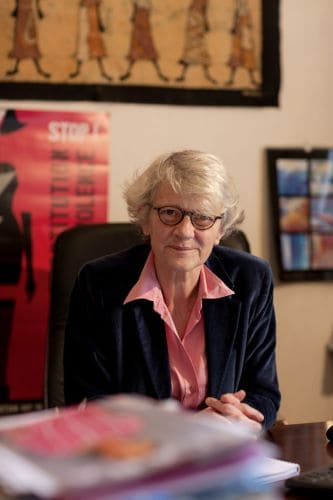“The day when I decided to fight for prostitutes”

Hélène de Rugy (H.77) saw her life take a 180-degree turn the day she chose a career in social services. Executive Director of the association L’Amicale du Nid, she helps prostitutes reenter the workforce. Her story.
I grew up in Lyon. I didn’t really know what I wanted to do with my life, so I decided to enroll in a preparatory class to enter HEC. Preparing for the exam was the option that opened the most doors, and I also wanted to experience living in Paris. I became a member of the second mixed male-female class in HEC’s history. It was pretty earth-shaking to realize, at the age of 15 or 16, that certain paths in life could be blocked to you just because you were a woman.
At the school, we often heard people say that women couldn’t meet the standards, that they would downgrade the prestige of the diploma. This wasn’t entirely false: when a profession admits women, it immediately loses some standing on the social scale. But we female students refused to be put down. We were determined to prove that we were worth something!
And, in spite of the sexism, I have great memories of my time at HEC. My studies there made it possible for me to travel a lot: to the US for a six-month training program, then to Hong Kong, then some small jobs in Taiwan and Japan. After I earned my diploma, I applied for a scholarship to return to Japan, where I spent two years. I was 21 years old. It was really exciting, but … I began to discover some stumbling blocks for me as a woman. In those days, Japanese universities were organized in the traditional way, with small groups of students around a master. When I met my master for the first time, he said, “You are a woman, so why are you studying at a university?” Japanese society is quite rigid – and extremely so for Japanese women.

© Thibaut Jeanson
Women at work
When I came back to France, I went to work for Proctor & Gamble, a big American corporation that produced cleaning products and toiletries. The job was demanding, but I learned a lot. One had to fight to succeed, and this challenge really motivated me. I think that any HEC student can understand how this felt. I held that job for five years and then got pregnant and continued to work just as much. Because I had worked too hard, my baby was very small when he was born. He is doing very well now, but his first days were problematic and I was terrified.
I began to ask myself some serious questions about my life, and a move abroad gave me an exit. My husband got a job in Germany, where we spent four years. I had other children and didn’t work. It was wonderful to spend so much time with my children, but not having a job really weighed on me. After this, we went back and forth between France and other countries, particularly Poland at the beginning of the 1990s. It was a country in the middle of a dramatic transformation at that time thanks to the fall of the Berlin Wall and the dissolution of communism.
“I wanted to do work that meant something to me and that advanced causes I believed in. Because of the choices I had made in my life up until then, I had somewhat missed out on the feminist struggle.”
When we came back to France for good, I realized that it was essential for me to go back to work. When a woman is a housewife, she has no social standing. I could no longer bear to be in this situation. I joined a startup involved in corporate mediation, and I worked there for a year. Until the day when the founder said, “Fantastic! Our company is starting to grow, so I’m going to hire a man!”
I was stunned. He wasn’t being mean; he just said exactly what he was thinking with no idea that there was anything questionable about it. But, his comment reminded me of what I had seen in Japan, and other things I had experienced. I realized that my social and professional lives would be determined by my gender. That was a real blow for me and it seemed insurmountable. That moment proved to be another turning point in my life. I knew I had to make a change. That’s when I decided to look for jobs with feminist associations. I wanted to do work that meant something to me and that advanced causes I believed in. Because of the choices I had made in my life up until then, I had somewhat missed out on the feminist struggle. How could I take part in it at that point?
Confronting violence head-on
In 2001, I had a meeting that permanently changed the course of my career. I answered an ad in Le Monde for a job with the association Du Côté des Femmes, and I was hired to be its Managing Director. The association had around 50 salaried employees and worked to defend women who had been victims of violence, particularly violence at the hands of their partners. I knew nothing about this kind of thing and had everything to learn, including about working in an association, social services in general, and fighting for feminist causes!
When you meet women who have been beaten by their partners, it changes your whole view of society. It also makes you see your own life in a new way. Remarks that people had made that I had once thought were merely funny now seemed signs of something that was actually extremely dangerous. Du Côté des Femmes offered emergency housing for battered women and, since they had lost their own homes, served as a mailing address for them as well.

© Thibaut Jeanson
One day, large groups of women from Sierra Leone began to come to us. First around 50 of them, then 100 and finally 140 young women. We eventually understood that they were all part of a prostitution network. It was a shock. Prostitution had not been on our radar up until then and we didn’t know how to deal with it. This is why I believe we need to train people to understand, identify and treat prostitution within the context of violence against women. We started to look for solutions and called on an association in this field to help us understand and work with victims of prostitution. This was my first contact with L’Amicale du Nid.
Humility is a great virtue, and you must be patient and listen to others; you shouldn’t try to change things too quickly. But, this kind of work environment is exceptionally fulfilling. In my view, the great challenge in building a career is to find something that you really want to do, and to resist just following the paths that have been laid out for you but that may not suit you. We need to take responsibility for our choices and to learn to recognize what we really want. This isn’t easy; it takes time. It took me 20 years. But I finally made it.
Published by Clémentine Baron

